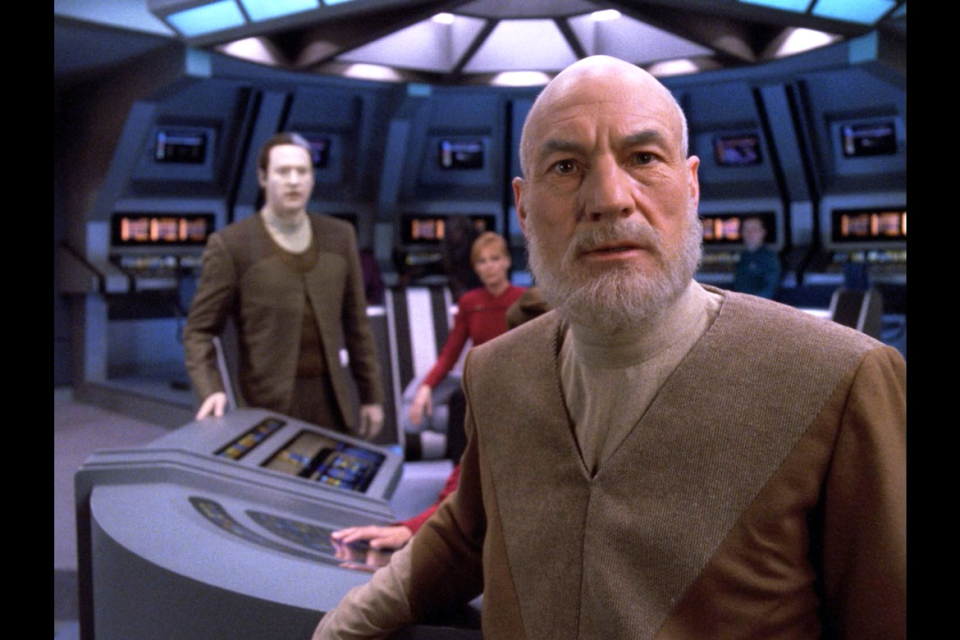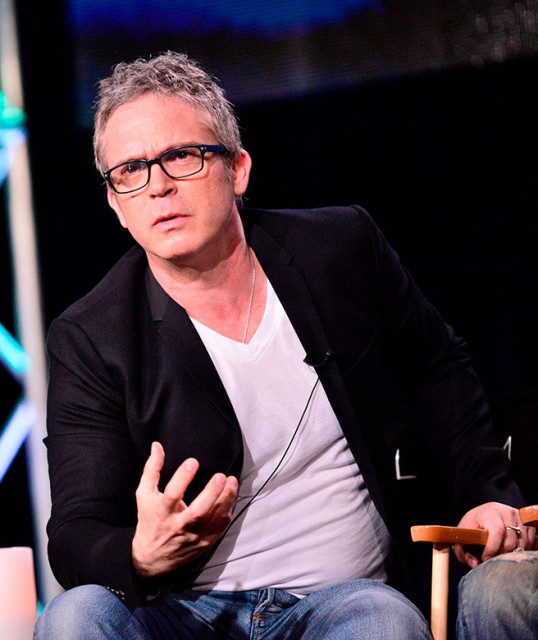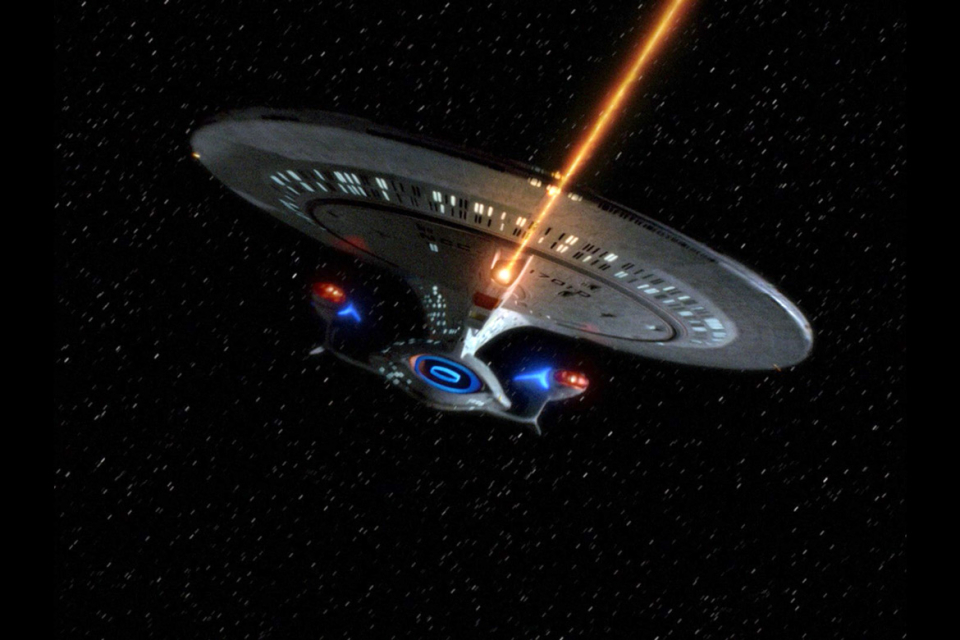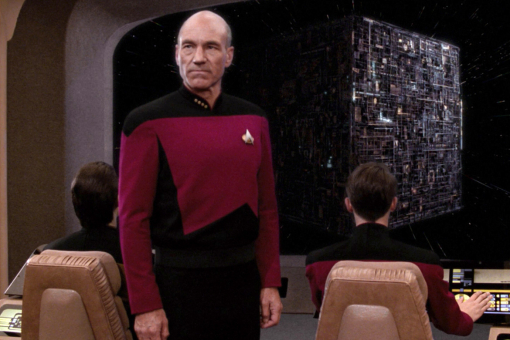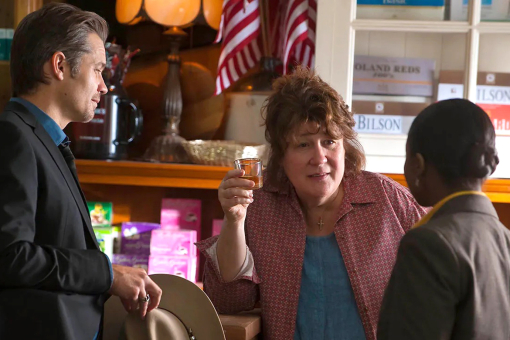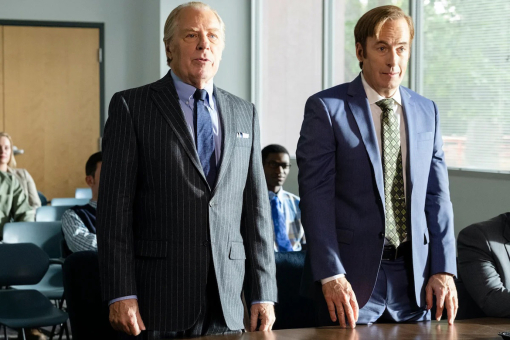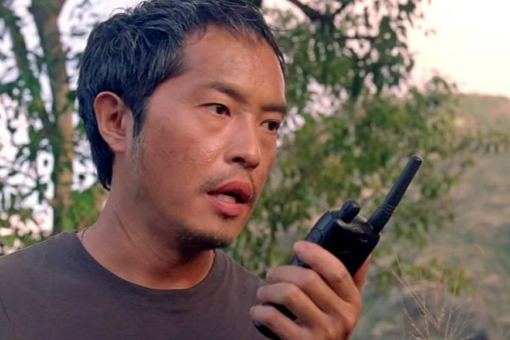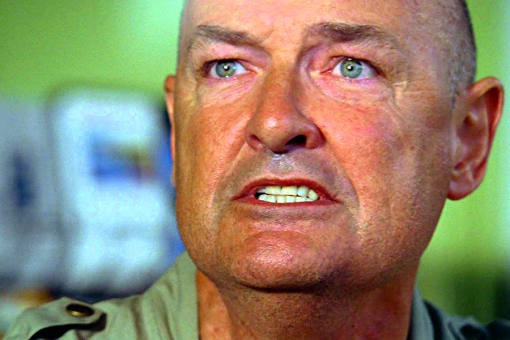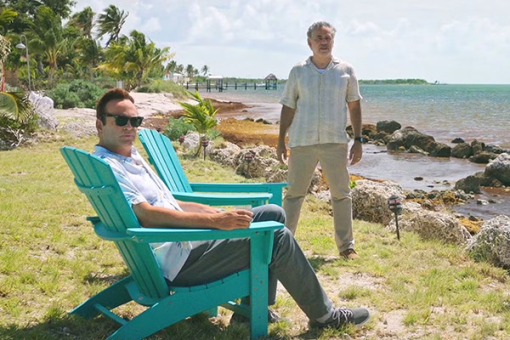Thirty years ago today, Star Trek writers Brannon Braga and Ronald D. Moore found themselves shouldering the unique responsibility of simultaneously writing The Next Generation cast's first Trek movie while also scripting their last episode of television.
For others, the dual writing duties would likely feel (at best) overwhelming. But that wasn't the case for Braga.
"We didn't flinch," Braga tells the Television Academy in an exclusive interview celebrating the 30th anniversary of TNG's series finale, "All Good Things...," which aired in syndication on May 23, 1994. "I can't speak for Ron, but I don't recall us ever saying, 'Should we be doing this?' We were deeply immersed in these characters. And I think there was something cool about doing a two-hour finale and the movie at the same time, because they were very different stories."
But both "All Good Things..." and what would go on to be the seventh Star Trek feature film, Generations, were similar in that they dealt with one of Trek's most popular plot and thematic devices: time. Ironically, time was also foremost on the then–writing team's minds as they juggled both scripts — with roughly three weeks allotted to write the series finale. Moore and Braga were in the middle of rewriting a draft of Generations when they were tapped by the late TNG showrunner (and Braga's mentor) Michael Piller to script "All Good Things...." The riveting two-part episode features Captain Picard (Sir Patrick Stewart) moving back and forth across three different time periods — with the help of his omnipotent nemesis, Q (John de Lancie) — on a mission to save the galaxy from an anti-time anomaly. As Picard struggles to restore temporal order to the universe, he must interact with three different versions of his beloved Enterprise-D crew — past, present and future — in ways that remind the considerate and accomplished starship captain to better appreciate how vital the here and now is, even in the time travel–heavy world of Star Trek.
Whereas Generations would garner mixed reviews from both audiences and critics upon its release in November 1994, "All Good Things..." quickly became a fan-favorite and is regarded by many as one of the most creatively successful series finales in TV history.
"It proved ultimately to be what the movie should have been," Braga explains. "The movie had a lot of cooks in the kitchen. There were many studio mandates. It was conceived to be a 'passing of the baton.' On 'All Good Things...,' [Paramount] largely left us alone. We were left to do what we do, and I think you can feel the benefit of that in the final product."
In honor of the 30th anniversary of "All Good Things...," Braga takes us behind the scenes of the writing process, shares which pivotal scene he and Moore watched being filmed and why a fourth timeline featuring the Borg was ultimately cut from the story.
Television Academy: Traditionally, the showrunner writes the series finale, but not in TNG's case. Do you recall when you and Ron were assigned the finale, and maybe what Michael's thinking was at the time with that assignment?
Brannon Braga: I don't know the exact timeline. But I do know that we received the movie assignment sometime in the seventh season of Next Gen. Because I remember we were pretty much in the throes of our 26-episode season and how excited we were. And that's a much longer development process, a movie. It's slower and bigger and more complicated. And, in the meantime, you're racing along with the TV show. I also remember not being too worried about [writing both the movie and the finale] because the TV schedule was such that the movie was a marathon, and the TV show was a sprint. And you just had to get the TV episodes written. So in some ways, I don't think we lost a step.
As for why we were chosen, I think [TNG executive producer] Jeri Taylor was probably already working on Star Trek: Voyager. And Michael, I believe, was also developing Voyager, but he still had a hand in Deep Space Nine.
When during TNG's run was it discussed that the seventh season would be its last, at the height of its ratings popularity?
Those conversations were happening really early. And the reason I remember that is because Michael Piller asked me to go [write on] Deep Space Nine at the end of season six of Next Gen. Piller wanted me to come over, and he really thought I would fit well with the concept. And I really liked Deep Space Nine. I love its concept, and I was really enchanted with the idea of working on that kind of Star Trek. But because he gave me the option, I declined. And the reason I gave him was, "I want to see Next Gen through to the end." And that's because I knew, at that point, that season seven was going to be the last season. But I didn't know about "All Good Things..." at that point. I didn't know that I would be working on the final episode. I just knew that I had to see Next Gen through, emotionally.
You and Ron seem to have taken the news rather well, of writing the last episode of Next Gen while in the middle of writing that cast's first movie.
I remember feeling excited. We didn't flinch. I can't speak for Ron, but I don't recall us ever saying, 'Should we be doing this?' We were deeply immersed in these characters. Ron had been writing the show for five seasons. I'd been writing it for four. That's nine seasons, collectively. And we were just in the middle of it. And I think there was something cool about doing a two-hour finale and the movie at the same time, because they were very different stories. For the finale, we were going to tell a movie-sized story with significant developments in the characters.
It's funny that "All Good Things..." was the easiest of the two. We wrote that much more quickly, I think we had three weeks on that script. It felt easier, because the movie had [input from] William Shatner, Patrick Stewart, the studio and [TNG producer] Rick Berman. The movie had a lot of cooks in the kitchen. A lot of mandates. It was conceived as a "passing of the baton." It had to have [Captain] Kirk, it had to have the Klingons. And Leonard Nimoy, at one point, crossed paths [with directing Generations].
What was the notes process like on the finale, or did the studio pretty much leave you alone?
[Paramount] largely left us alone. The studio wasn't giving us notes. We were left to do what we do, and I think one can feel the benefit of that in the final product. Rick gave us notes, I'm sure, but not many. And it was his suggestion for Picard's last line, in the poker scene, the "sky's the limit" line.
Speaking of that last scene, where Picard joins the crew's traditional poker game for the first time, I know that also was the last scene shot for the show. Were you able to go to set for that?
That was the one time Ron and I went to the set. We didn't go to the set often, because there was usually no time when you're doing 26 episodes. You're either writing or in the writers' room. But we went down for certain scenes. We went down to meet Stephen Hawking, who was in another poker scene [the season six episode "Descent, Part I"]. But for the finale's poker scene, we just wanted to be there, because we knew it was the final scene. It was the last scene to be shot. It was a strange mixture of emotions, because there were tears. Some people were very moved, because this was the end of seven years. The show was enormously popular at the time. It was taken off air at the height of its popularity, which was a smart move in some ways.
But despite the bittersweetness of it all, they were reconfiguring the sets for the movie. The movie started shooting in a week. There was a compartmentalization going on. The show was the show, and the movies were the movies. They were just different. But it was a very emotional moment. And I think that almost always comes across on-screen. I think you sense the authenticity of what the actors are going through in that scene. To me, that scene boils down to the subtlety of Patrick's performance. And I would credit Marina Sirtis [who plays the Enterprise's empathic counselor Deanna Troi] with her delivery of the "You were always welcome" line to Patrick. It was very moving. Marina's a great actress, very instinctive.
The anomaly Picard and the Enterprise crew must stop concerns anti-time, which is a very clever concept and plot twist. How did you and Ron come up with that?
I distinctly remember sitting in Ron's office and coming up with the phrase "anti-time." That came out when we were writing; I think I was typing and Ron was pacing, which was usually the case. We hadn't really figured out all the particulars or what we sometimes called "technobabble," but in this case, I think it was conceptual. The conceit was coming up with the anti-matter equivalent of time. And it was just one of those things where you suddenly had something to hang your hat on, like, "If it's like anti-matter with time, I think I know how we can explain what's happening and why it's dangerous, because you don't want time and anti-time to collide, much like you don't want matter and anti-matter to come together, either.
In an early version of the story, instead of using Dr. Beverly Crusher's (Gates McFadden) medical ship, the Pasteur, the crew in the future timeline were going to take the mothballed Enterprise from a museum—
Yes, and that was cut from an early draft. We really wanted to do it, too, but we ended up on Beverly's medical ship instead. But that's not what it was supposed to be. It was supposed to be stealing the Enterprise out of a museum, which I think Terry [Matalas, Braga's former writer's assistant] ended up doing a version of on [the final season of] Picard. By the way, if you think about it for a second, it's much better, because you've got the three Enterprises working together. That's perfection. With all due respect to Beverly's medical ship, it would have been more emotionally satisfying if it were the Enterprise.
There was a fourth timeline involving the Borg that stemmed from the events of TNG's third season finale, "The Best of Both Worlds, Part I." Do you recall any scene specifics?
I may be misremembering, but it may have had to do with an assimilated Earth.
Oh, wow.
I believe it was a timeline where the Borg had won. But I know we added it because we thought we needed additional stakes, that the time anomaly might be too abstract. And we were eager to bring the Borg back, because we hadn't really dipped our toe into the Borg, full throttle, like we did with "Best of Both Worlds." I don't remember specific scenes, unfortunately. But I do remember it didn't last long. It wasn't working. Michael didn't want it. It became pretty clear, pretty quickly, that three was the right number. But that was something Ron and I carried into the development and script for Star Trek: First Contact [the 1996 sequel to Generations].
I am surprised you didn't ask me about the "people getting younger" subplot that Michael Piller wanted to do.
Whoa, I didn't even know that was a thing, and I've watched this episode a ton. Can I ask you about that now?
I'm going to tell you about it. So there was a subplot that took place in the present-day storyline, where we were going to have all these ships that came and gathered around the anomaly, because it turns out that the anomaly had some anti-aging effect. It was de-aging people, and ships were gathering from all over to soak in the rays of the anomaly.
So that explains, in part, where a pregnant nurse on the Enterprise becomes "un-pregnant" and loses her baby. And why Geordi LaForge's [the blind engineer played by LeVar Burton] eyes start acting up.
Right. Those are little remnants of the storyline that got cut. And I think the reason it got cut out was it didn't have to do anything with anything. Ron and I were resistant to it, because we didn't think it really serviced the main plot of the episode, the emotional story for the characters. And, of course, Michael Piller would end up taking those ideas and using them in [the 1998 feature film] Star Trek: Insurrection.
How was it when you first watched the final episode? Do you remember where you were?
I had seen early cuts of the episode, but the first time I saw it was at the premiere on the lot that Paramount did. And Michael wasn't generous with his compliments. So when he did compliment you, it really meant something. And I remember every one, because he was a real mentor to me. And I owe so much to him. And he complimented us at the after-party. He was happy. And it was his legacy, too.
All seven seasons of Star Trek: The Next Generation are now streaming on Paramount+.



